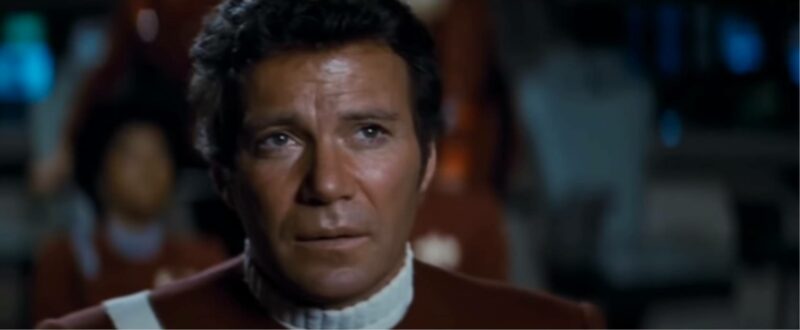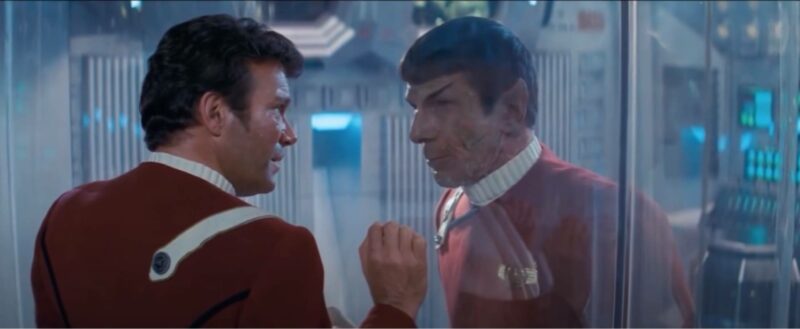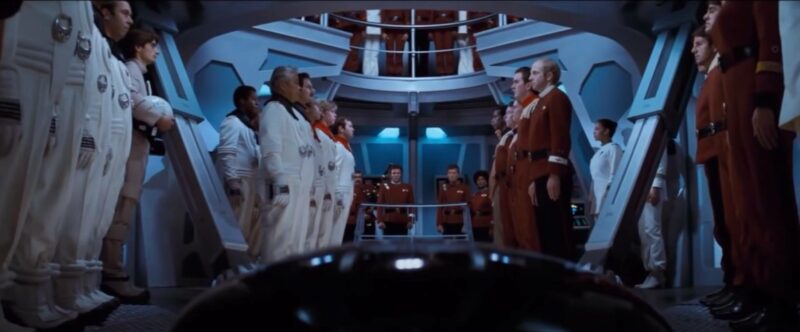
Our in-depth, multi-part dissection of Star Trek II: The Wrath Of Khan ends with a close look at its iconic, powerful ending. Spoilers within:
NB: The following contains spoilers for Star Trek II: The Wrath Of Khan.
Given how powerfully The Wrath Of Khan ends, it is easy to miss the beauty in it, certainly in terms of how perfectly it caps off a character journey for Admiral James T Kirk that we’ve witnessed almost from minute one. It may be Spock who dies in The Wrath Of Khan, but the film is unquestionably about Kirk.
It’s also hard to overestimate how much of a shock Spock’s death must have been at the time. Characters like Spock didn’t die. You didn’t kill off someone like Leonard Nimoy. Star Trek had emerged from an era of largely safe, colourful, now even kitsch television in which America reflected its aspirational virtues for the post-war future in the 1960s through its heroes. Kirk. Bruce Wayne. Jim Phelps. Cinema had James Bond or Matt Helm. Morally flawed or compromised at times they might have been, but they were designed to save us from the hopeless devastation a generation had lived through. Star Trek’s heroes would fight battles, defeat foes, explore new worlds, but they would always at the end finish the show with a little joke or the acknowledgement that they’ll be back next week for another adventure.
Even The Motion Picture, which tones down the colour and comedy of The Original Series to depict a post-Watergate, cooler vision of Starfleet’s future, saw Admiral Kirk and the Enterprise—with Spock having regained his purpose as a Starfleet officer—warp away toward a sequel. The human adventure, after all, was just beginning. Nicholas Meyer’s sequel is a humanistic film, but it acknowledges that with hope has to come the balance of pain and of sacrifice. While Kirk’s arc of spiritual rebirth has a resolutely Christian bent, Spock giving his life to save the Enterprise makes him the Christ figure who saves the crew from Khan’s defeated Devil. Kirk’s first best destiny is to lead, to find his way back to himself – and to do that he must lose someone he takes for granted for much of The Wrath Of Khan. His anchor. His best friend.
The way Meyer constructs these final scenes, as the Reliant prepares to detonate the Genesis device, is majestic.

It was another master stroke to enable a final conversation between Kirk and Spock as the latter is dying, separated by glass. This is easily among the most iconic moments in cinema history, precisely because of how well it has been earned. The audience, as of 1982, has 15 years of investment in these characters; while The Original Series ended in 1969, The Animated Series, fan conventions, tie-in novelisations, comics and then The Motion Picture maintained a strong fan base across the 1970s.
The show’s return as a film franchise would be the equivalent of, recently, shows such as The X-Files returning after a 10 year gap with the same actors. To witness the death of Spock, the most popular character in Star Trek history, was and remains devastating. Meyer does a lot of work in The Wrath Of Khan itself, also, to ensure these sequences land with the emotional sucker punch they deserve. Kirk’s heart is visibly breaking before his friend, stunned by how quickly this has happened, as Spock maintains a stoic resolve in the face of the death.
Spock even finds time for some gallows humour. “I never took the Kobayashi Maru test… until now. What do you think of my solution?”

This bleeds into the deeper thematic ideas running through the film: how Kirk has spent a long time running away – from family, from his destiny, from death itself. As his purpose is reborn in the fire of Genesis, and of Khan’s vengeance, Meyer concludes the film with the bigger message: Kirk must face what he has avoided all of his life in order to regain what he has lost.


Suggested product
SPECIAL BUNDLE! Film Stories issue 54 PLUS signed Alien On Stage Blu-ray pre-order!
£29.99
Spock’s death, one devoted to “the needs of many”, that “outweigh the needs of few, or the one”, is Kirk’s final trial. Everything about this moment is devastating to watch, particularly Spock’s emotional final words, which betray the humanity he has always balanced within. “I have been and always shall be your friend. Live long and prosper.”
When Nimoy himself died in 2014, I remember posting the still of Kirk slumped before Spock, shattered by his death. It felt appropriate. It’s how we all felt as Trek fans.
In case the Spock as Christ allegory wasn’t clear, Kirk spells it out during his emotional eulogy: “This death takes place in the shadow of new life, the sunrise of a new world, a world that our beloved comrade gave his life to protect and nourish. He did not feel that sacrifice a vain or empty one.”
Meyer presents Spock’s funeral in the grand tradition of a military burial at sea, with pomp, circumstance and in this case Scotty playing Amazing Grace on the bagpipes, with the body being returned to the sea exchanged with the photon torpedo tube being fired into the newly formed Genesis planet. Life from lifelessness. And though it’s clear Meyer never intended to set up Spock’s eventual resurrection, he provides Gene Roddenberry, Harve Bennett and Leonard Nimoy the unintentional seeds of his return in the choices made at the end of the film. “He’s not dead, as long as we remember him,” McCoy tells Kirk in the final moment – a line buoyed in retrospect with the knowledge that Spock transferred his katra to Bones.

This choice suggests Meyer could have imagined Spock’s story to include a biblical resurrection, even if perhaps the mechanism of how that’s realised in The Search For Spock turns out to be more scientific than spiritual. Or did Meyer simply imagine Spock transplanted his memories into Bones, as opposed to his “living spirit” as Sarek later describes it?
McCoy certainly doesn’t show any real indications here of the katra effects as we later see in The Search For Spock, so it’s probable Meyer instead imagined Spock may have used Bones’ mind as a repository, rather than a means to bring him back. It also fits with the idea of Kirk’s journey as one of reconciling the memory of his past with the reality of his future. Kirk certainly suggests Spock was trying to communicate with him via A Tale Of Two Cities earlier in the film: “’It’s a far, far better thing I do than I have ever done before. A far better resting place that I go to than I have ever known.’”
David has come to understand differently over the course of the film. “You knew enough to tell Saavik that how we face death is at least as important as how we face life,” he says.

This is what Spock wanted him to understand. That Kirk didn’t need to run away from mortality, from the end, and embrace the life he has left. Losing the person he platonically loves the most teaches him this, and David’s embrace of him as this transformed, reborn person, is what allows Kirk to find peace. It’s a beautiful moment, and services David’s own transformation from irascible cynic to a believer in the possibility that he might see Kirk as a father. Kirk has a second chance at a life he imagined was long lost to him.
The Wrath Of Khan ends with Kirk’s immortal final words, looking out at Genesis, after being asked how he feels: “Young. I feel young.”
It’s a perfect line that caps off the best arc the character ever experiences during this first film incarnation, and establishes the state of Star Trek itself. The Wrath Of Khan is a rebirth. It changes the direction of the franchise, influencing it for decades to come in style and texture. Nicholas Meyer’s influence on what we know Star Trek to be cannot be overestimated. It’s almost on par with Roddenberry’s original vision in the mid-1960s, managing to contextualise Star Trek at the beginning of a new decade and allowing it to forge its own, unique, post-60s identity. Spock dies in some sense to save Star Trek, even if he ends up being reborn to appease the masses.
For this reason, among many, The Wrath Of Khan stands as the most accomplished, poetic and beautiful film in Star Trek history. It makes me feel young on every rewatch.
Read the previous part of AJ Black’s six-part Star Trek II series – Exploring Kirk’s journey from regret to rebirth






